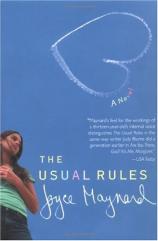The Usual Rules
Review
The Usual Rules
At some point even the most extreme and horrific events, so raw and immediate now, become history. Novels, as opposed to other art forms or nonfiction, are a good gauge of this moment --- the moment when we can examine an event and begin to understand its aftermath and consequences.
As evidenced by Joyce Maynard's latest novel THE USUAL RULES, 9/11 is now one of these events that characters (read: we) have survived and built a life after and in response to. This novel is not about 9/11, but that is the starting point --- the catalyst for action and change.
On Tuesday, September 11th in Brooklyn, thirteen-year-old Wendy sits in class just as she would any other weekday. She left home slightly angry at her mother and a little annoyed at her stepfather, which seemed typical to Wendy these days. But when the earth beneath New York City shook and debris started raining from the sky, Wendy's perspective changed.
Wendy's mother, a former dancer, worked in one of the World Trade Center towers. After the attack, Wendy, her stepfather Josh and her little brother Louie hold on to hope that she has survived. As the days go by, it becomes apparent that Wendy's mother is dead. When the biological father she hardly knows (but always dreams about) shows up, Wendy decides to go to California with him. She hopes that life with her father will help her heal and allow her to create a new life for herself. But she doesn't realize how difficult it will be to start again and leave Josh and Louie behind.
In California Wendy does create a new life, but one based almost solely on shedding the traces of her past. She stops going to school and spends her time at a local bookstore reading the classics suggested by the friendly owner. She also befriends a teenage mother struggling to raise her son alone. To each she tells a different story of who she is and where she comes from. And she tries to build a family with her father and his girlfriend, who have family issues of their own. Much of Wendy's California life is concerned with defining family, and ultimately she yearns for the one she left behind in New York.
THE USUAL RULES, as much as it is about healing and growing up, is about family. Yes, Wendy must mourn the loss of her mother, and Maynard captures her loss with a stinging accuracy. But the real story is that of Wendy gaining strength and deciding what she will do with her mother's memory, who she will become, and who she will include in her redefined understanding of family.
Maynard's novel begins with an interesting prologue --- the story of Wendy's name. The prologue shares with the reader the family mythology Wendy's mother created for her. It also points to fairy tales fractured (Wendy is named for the nurturing character in Peter Pan) and how, while we may know who our parents hoped we'd be, we must on some level decide for ourselves who we will become.
THE USUAL RULES is a tearjerker without being saccharine. It is written with an understated grace and clarity. The characters come across as real; sometimes frustrating, always likable. Maynard's stilted style is slightly unconventional and can be jarring at first. The flow of the novel comes from the action and emotion, for the most part, and not from the language. Yet it is easy to become lost in Wendy's story, and Maynard's unique voice becomes more comfortable to read as the novel progresses.
Maynard's novel is many things --- a coming-of-age story, a story about discovering family, a story about healing --- all set against a national tragedy of singular proportion. Rarely do authors capture so well the voice, mind and heart of a thirteen-year-old girl, but Maynard does so with ease. THE USUAL RULES is an honest and quietly amazing novel.
Reviewed by Sarah Rachel Egelman on February 18, 2004
The Usual Rules
- Publication Date: February 18, 2004
- Genres: Fiction
- Paperback: 400 pages
- Publisher: St. Martin's Griffin
- ISBN-10: 0312283695
- ISBN-13: 9780312283698









